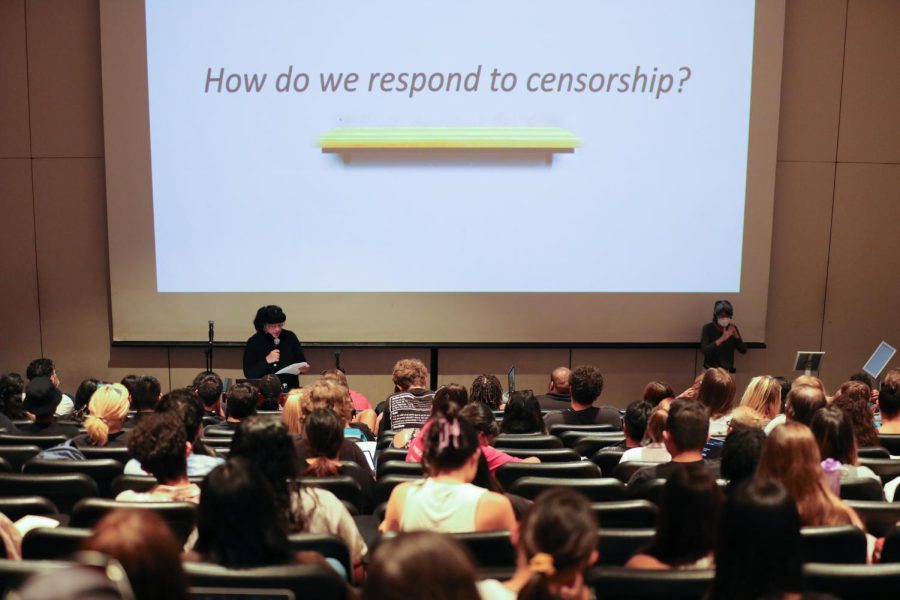Banned Books Readout highlights censorship efforts
October 8, 2022
CSUN held its 10th annual Banned Books Readout on Thursday, Sept. 29, at the University Student Union Theatre. The event was hosted by the University Library, CSUN’s Department of Journalism, CSUN’s Queer Studies Program and the Pride Center. The keynote speaker Karimah Tennyson-Marsh is a teacher for Century Community Charter School in Inglewood, California.
With welcoming remarks, Coleen Martin, research and instruction librarian, initiated the event and shared her enthusiasm to finally be able to hold the event in person after two years online due to the pandemic.
Katherine S. Dabbour, associate dean at the University Library, gave the opening remarks. Dabbour shared some statistics regarding the magnitude of the increase of book bans worldwide, including that “total book challenges are set to exceed the record set in 2021.”
Dabbour ended her opening remarks by stating, “If you don’t like a book just leave it on the shelf.”
Elizabeth Blakey, an associate professor in the journalism department, covered the topic “Belonging on the Shelf and How Do We Respond to Censorship?” Blakey interacted with the audience by clapping her hands and playing music. The audience responded well to her entrance and enjoyed her keenness. She left the stage with the message that, “We are a strong community bound together because of the beauty of our differences.”

Keynote speaker Tennyson-Marsh has been an educator for 20 years and is now a writer for the blog Rich in Color. She shared her experience as an educator who has seen firsthand how incorporating diverse literature in her curriculum can make a difference by allowing students to broaden their perspective on learning about different controversial topics. Her goal is to make students feel safe, as well as seen.
“Books reveal secrets we can keep from ourselves,” Tennyson-Marsh said. She continued to tell the audience a story about her students. Some of her students had asked her for LGBTQ-friendly books. Out of excitement one of them screamed, “Do you have lesbians?” For Tennyson-Marsh that was a moment of clarity and a sign that she was creating a safe space for her students.
She has since incorporated the book “Fresh Ink” to her curriculum, as well as other books that cover controversial topics.
“I have had transgender students in my classroom, and I want them to feel safe with me and to teach my other students a different perspective … I have students reflect on the stories,” Tennyson-Marsh said.
According to Tennyson-Marsh, voting is an essential step in the right direction to impact banned books in a positive manner.
“Honestly I had never thought of doing something like this because I just teach, I was invited, and I was like, ‘Sure, I love talking about banned books and not being silenced,’” Tennyson-Marsh said. “Go out and vote and register and get involved, tell the younger generation to tell others who can vote to go vote.”
As the event came to an end, CSUN journalism students read from several banned books, including “I Know Why the Caged Bird Sings” by Maya Angelou, “Thirteen Reasons Why” by Jay Asher, “Beyond Magenta: Transgender Teens Speak Out” by Susan Kuklin, “Me and Earl and the Dying Girl” by Jesse Andrews, “The Hate U Give” by Angie Thomas, “Lawn Boy” by Jonathan Evison, “Gender Queer: A Memoir” by Maia Kobabe and “This Book is Gay” by Juno Dawson.
“Events such as Banned Books [Readout] offer a safe space for marginalized communities that are constantly silenced,” CSUN journalism student Rocky Walker shared.
According to Tennyson-Marsh, most books being targeted incorporate aspects of the LGBTQ community, diversity and controversial topics. Book bans are typically pushed by parents or communities who feel the need to censor literature because they believe their content to be inappropriate.
Throughout the years Banned Books Week takes place in various locations, but all for the same purpose — to freely advocate as well as celebrate literature.
